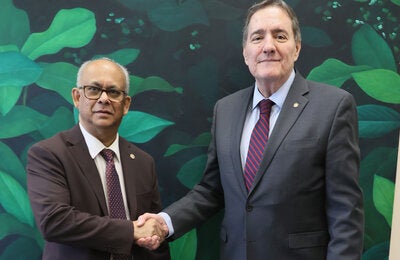
Washington, DC, 24 November 2020 (PAHO) - The COVID-19 pandemic has impacted the normal functioning of health education institutions, abruptly altering educational activities since mid-March 2020. In response to this challenge, one of the first actions carried out by the faculties and schools of health sciences was the emergency migration from face-to-face to online activities, canceling the attendance of students at hospitals and health centers to avoid the spread of the virus. Undergraduate residency and internship programs also had to be modified, and many clinical rotations were replaced by virtual case reviews.
During the pandemic, academic institutions in the Region of the Americas have developed many other initiatives, including massive implementation of virtual education, purchase of digital equipment and increase in broadband Internet, online training of faculty members, the offer of mental health programs, acceleration of licensing, implementation of telemedicine consultations, the flexibility of examinations, and support for educational research projects. Also, it was sought to preserve postgraduate training, strengthen continuing education, support telework coordination, and provide remote medical assistance.
"The new normal should serve to take on the lessons learned from the pandemic and begin a thorough review of the training of health professionals. We must promote the fundamental transformation of medical education and the education of health professionals with a new dynamism”, said Ricardo León, President of the Pan-American Federation of Associations of Faculties and Schools of Medicine (PAFAMS). The PAFAMS has received during the recent PAHO 58th Directing Council the re-designation as a non-state agent in official relations with the Organization.
Within this context, PAHO has accompanied in recent months multiple virtual activities organized by the networks of associations and faculties of medicine at the international level where the prospects for the future development of health education were discussed.
PAHO participated as a member of the organizing committee and the scientific committee of the International Conference “Primary health care: A path to social justice”, organized by “The Network: Towards Unity for Health (TUFH)” and the National Autonomous University of México (UNAM, in Spanish), held virtually from 23-25 September 2020, with more than 700 participants from all over the world. This event culminated with the publication of the "Declaration of Mexico TUFH 2020".
Likewise, PAHO actively participated in a series of virtual meetings organized by PAFAMS with the slogan “Best practices of medical education in times of COVID-19”. These webinars were attended by the World Federation of Medical Education, the presidents of the national associations of medical schools and faculties from Argentina, Bolivia, Canada, Chile, Dominican Republic, Ecuador, Mexico, Peru, and United States, as well as the directors of the medical schools from Costa Rica and Panama.
PAHO has also sponsored several webinars developed by the Andean Network of Associations of Faculties of Medicine which sought to discuss the challenges and advances in the transformation of health education during the COVID-19 pandemic.
Finally, it is worth highlighting the intense international work carried out with the Faculty of Medicine of the Autonomous University of Mexico and the Latin American and Caribbean Association of Faculties and Schools of Medicine (ALAFEM/UDUAL, in Spanish) through a series of webinars held from August to October 2020, ending with the 2020 Knowledge and Transformation Forum.
These actions are part of the joint efforts of PAHO and the countries in the Americas to advance in the implementation of the Strategy for Human Resources for Universal Health and its 2018-2023 Plan of Action.



